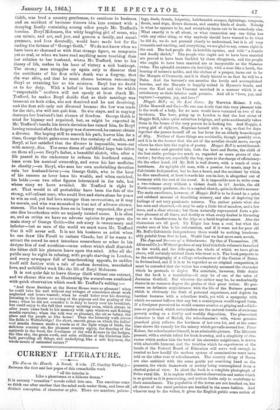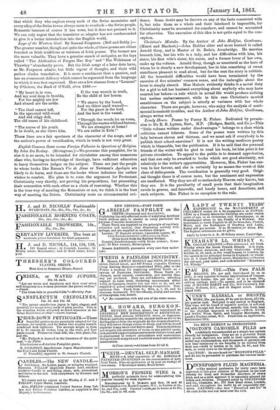The Joys and Sorrows of a Schoolmaster. By One of
Themselves. (W. AllanandCo.)—Without preface of any kind this little volnme is launched on the world, and the title-page, the whole of which we have given above, will certainly mislead those who trust to it. The book purports to be the autobiography of a vilInge schoolmaster of the Canton of Berne. in Switzerland, and jilt is to be regarded as an original composition, it must be conceded that the writer has completely assumed the character which he pretends to depict. We entertain, however, little doubt that the book is a translation—it may be of one of the tales of Teremias Gotthelf. But whoever the author may be, he undoubtedly shares in no common degree the genius of that great writer. He pos- sesses an intimate acquaintance with the life of the Bernese peasant which is obviau.sly the fruit of personal experience, and depicts its harsher features with- a relentless truth, yet with a sympathy with which we cannot believe that any but a countryman would regard them.
If a foreigner perceived he would censure avarice so griping and selfish- ness so profound, which nevertheless are the natural results of extreme poverty acting on a thrifty and worldly disposition. The pleasautest character is that of Madeli, the schoolmaster's wife, whose genuine practical piety relieves the hardness of her own lot, and at the same time shows the remedy for the misery which prevails around her. Peter Kaiser, the schoolmaster himself, is an admirable picture. The illiterate peasant, with a certain talent for book-learning, and a simplicity of cha- racter which makes him the butt of his shrewder neighbours, is drawn with admirable humour, and the troubles which he experiences at the hands of the Federal Board of Education will serve well enough to remind us how hardly the modern system of examinations must have told on the older race of schoolmasters. The country clergy of Berne are also satirized with the same gentle yet searching hand as the peasants, the whole framework of society being contemplated from, a clerical point of view. In short the book is a complete photograph of Swiss rural life. It is replete with shrewd observation and satire which is as genial as it is penetrating, and notices faults only to contribute to their amendment. The population of the towns are not touched on, but all classes of the rural parishes are handled in the same fashion. And whoever may be the writer, it gives the English public some notion of
that which they who explore every nook of the Swiss mountains and every alley of the Swiss towns always seem to overlook—the Swiss people. Romantic interest of course it has none, but it does not pretend to it. We can only regret that the translator or adapter has not condescended to give it a better introduction into the English world.































 Previous page
Previous page